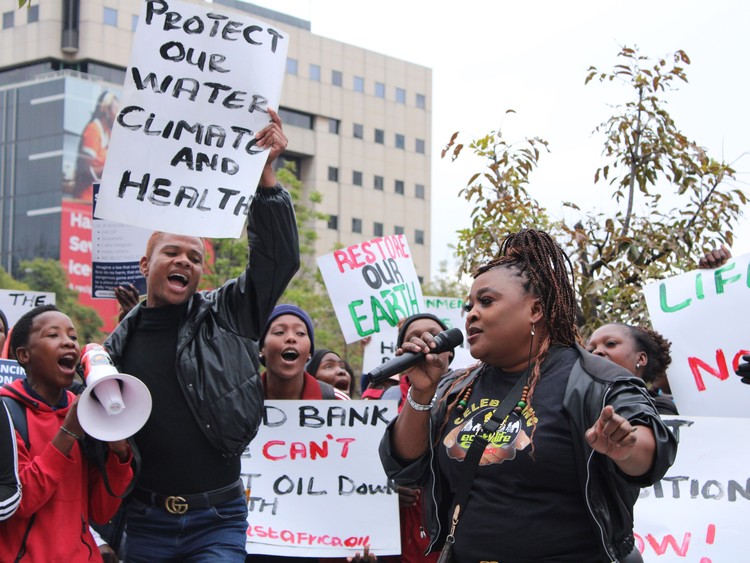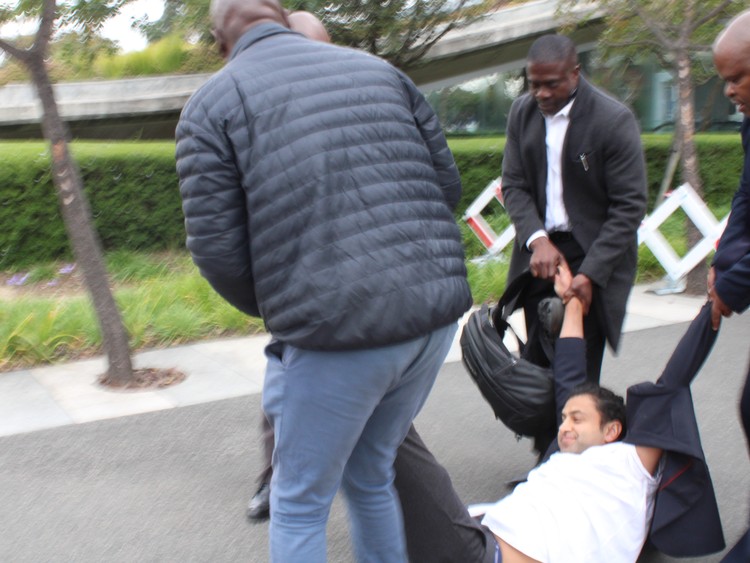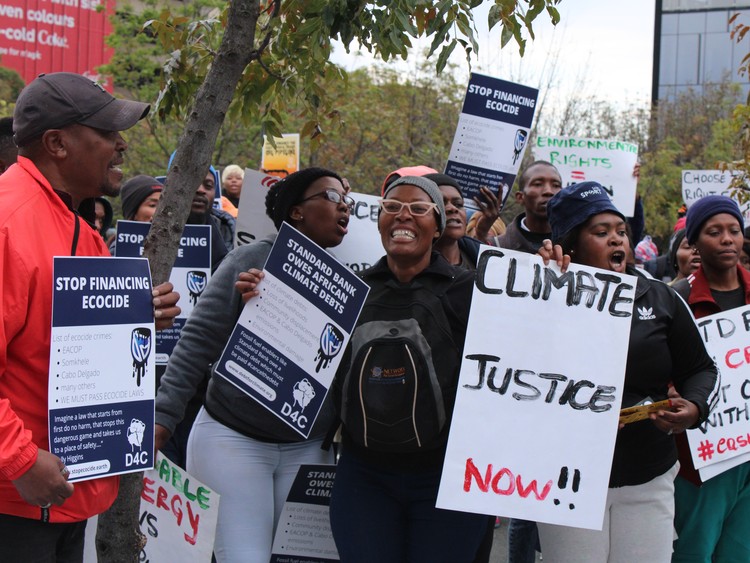Climate activists disrupt Standard Bank AGM
About 200 people picketed at the bank’s head office to demand it stop investing in fossil fuels
About 200 protesters, under the #StopEACOP campaign, picketed outside Standard Bank’s head office in Johannesburg. They want the bank to stop investing in fossil fuels. Photos: Masego Mafata
- Ten climate activists disrupted Standard Bank’s Annual General Meeting on Monday morning.
- They are calling on the bank to stop investing in fossil fuels and “withdraw any and all support for the East African Crude Oil Pipeline (EACOP) project”.
- The activists were joined by about 200 protesters, under the #StopEACOP campaign, who picketed outside the bank’s head office in Johannesburg.
- The activists say money used to fund fossil fuels should be diverted to fund the development of renewable energy systems that uplift communities.
Ten climate activists, dressed in suits and ties, managed to disrupt Standard Bank’s Annual General Meeting on Monday morning. The group were among about 200 people who gathered outside the head office in Rosebank Johannesburg, demanding that Standard Bank stop investing in fossil fuels.
Extinction Rebellion, the organisers of the action, said Standard Bank should instead invest in renewable energy for low-income communities that are most affected by “energy poverty”. According to Habitat for Humanity, energy poverty is defined as “a lack of access to adequate, affordable … safe and environmentally sound energy services to support development”.
The activists blocked the entrance to the venue where the AGM was scheduled to take place from 10am. They were forcefully removed from the building, with some being kicked and dragged off by security.
Outside, they joined the rest of the protesters from various climate advocacy groups calling on the bank to stop investing in fossil fuels and “withdraw any and all support for the East African Crude Oil Pipeline (EACOP) project”.
The East African Crude Oil Pipeline Project is built to transport oil extracted from Uganda’s Lake Albert oilfields to the port of Tanga in Tanzania and sold to the global market.
Climate advocacy groups have come together under the #StopEACOP campaign, condemning the construction of the pipeline, as well as Standard Bank’s support and financing of the project.
Extinction Rebellion’s Malik Dasoo was one of the activists dragged out of Standard Bank’s head office after they disrupted the bank’s AGM.
According to #StopEACOP, the displacement of thousands of families and farmers, and the contamination of water sources are among the risks the pipeline poses. Activists argue there are threats of oil spills in the Lake Victoria basin which sustains more than 40 million people. This, the campaign states, is in addition to the over 34 million tonnes of carbon emissions the pipeline would generate annually, worsening the climate emergency.
“They must stop financing the destruction of our planet and the uprooting of our communities. It is time to divest from all things related to fossil fuels. EACOP won’t happen on our watch. We are tired of you funding the destruction of our people and stealing our land,” said Ulrich Steenkamp from Earth Life Africa.
Mummy Mabe told GroundUp that she has seen the impact of fossil fuel-generated energy in Tembisa.
“We know using fossil fuels accelerates climate change, and climate change is affecting us in Tembisa. Many people rely on the crops they grow in their yards to feed their families and to sell for an income, but because of unpredictable weather patterns and toxic rain, our crops are not growing anymore,” she said. Mabe said she works with her community to tackle illegal dumping and clean streams.
Uhuru Mbele said unreliable electricity supply coupled with loadshedding contributes to the high rates of femicide, especially in township communities. She said issues of climate change, energy security and inequality are “interlinked”.
Mbele, is the founder and programmes coordinator of Tosunga Baninga, an organisation assisting survivors of gender-based violence, based at Orange Farm. “People are no longer feeling safe in our communities. We have seen a rise in the number of women murdered in blacked-out streets during loadshedding,” she said.
Climate activists from Vosloorus said their communities have poor air quality and flooding as a result of mining of fossil fuels in the area.
Extinction Rebellion wants Standard Bank to invest in renewable energy for low-income communities most affected by “energy poverty”.
In addition to the call for disinvestment from fossil fuels, they also demanded that Standard Bank work with communities – especially low-income communities – and civil society to support projects which prioritise an end to energy poverty.
The activists say money used to fund fossil fuels should be diverted to fund the development of renewable energy systems which uplift communities.
“We believe that energy justice should be a fundamental principle guiding Standard Bank’s green energy financing and wish to denounce their greenwashing initiatives,” said Extinction Rebellion national coordinator Malik Dasoo.
There was no memorandum handed over during the picket. #StopEACOP’s Zaki Mamdoo said climate advocacy groups had submitted numerous memorandums to Standard Bank in the past, but received no response.
The article will be updated to include responses from Standard Bank, once received.
Response from Standard Bank
Ross Linstrom, Standard Bank spokesperson told GroundUp, “Access to reliable electricity is one of the biggest challenges in Africa. To this day, half a billion people still don’t have access to grid electricity. One of Standard Bank’s main aims is to ensure that additional access is made possible for citizens of rural Africa through off-grid solar solutions that are cost-effective, greener, faster and renewable.”
As one of the potential lenders to the East African Crude Oil Pipeline project, Linstrom said they are relying on an independent environmental and social consultant to do due diligence.
“The consultant recently concluded an update of the environmental and social due diligence report which has been shared with the lenders for their consideration. As part of Standard Bank’s own due-diligence, internal experts are currently reviewing the findings of the report.
Once complete, Standard Bank will provide its final assessment and make a decision within the project’s timeframes. The lenders’ E&S due diligence will only be concluded after all necessary conditions for final financing approval have been met by the project,” he said.
“Standard Bank’s participation in the funding of the project remains subject to its credit approval process which includes evaluating the findings of the E&S due diligence assessments and complying with the requirements of the Equator Principles.”
Next: Commuters call for better lighting and security at Parow station
Previous: Row over human settlement minister’s “lift” dismissal
© 2023 GroundUp. This article is licensed under a Creative Commons Attribution-NoDerivatives 4.0 International License.
You may republish this article, so long as you credit the authors and GroundUp, and do not change the text. Please include a link back to the original article.
We put an invisible pixel in the article so that we can count traffic to republishers. All analytics tools are solely on our servers. We do not give our logs to any third party. Logs are deleted after two weeks. We do not use any IP address identifying information except to count regional traffic. We are solely interested in counting hits, not tracking users. If you republish, please do not delete the invisible pixel.





